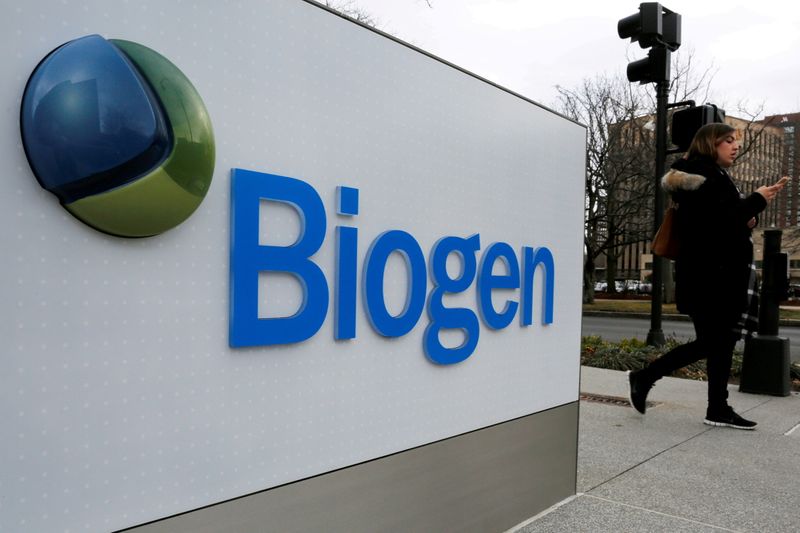© Reuters. FILE PHOTO: The Alzheimer’s drug LEQEMBI is seen in this undated handout image obtained by Reuters on January 20, 2023. Eisai/Handout via REUTERS/File Photo
By Deena Beasley and Julie Steenhuysen
LOS ANGELES (Reuters) -Eisai and Biogen (NASDAQ:)’s Leqembi won a coveted standard approval nod from the U.S. Food and Drug Administration on Thursday, the first Alzheimer’s treatment to achieve that goal, clearing the way for wider insurance coverage of the drug.
The FDA decision marks a new milestone for a fatal disease that has eluded drugmakers’ efforts for decades. Trial data showed that the treatment slows progression of the brain-wasting disease by 27% for patients in the earliest stages of Alzheimer’s.
The FDA also placed its strongest “boxed” safety warning on Leqembi’s label, flagging the risk of potentially dangerous brain swelling for Alzheimer’s drugs in the same class.
Shares of Eisai tumbled in Tokyo trade on Friday, with analysts citing the safety warning as a negative surprise.
Leqembi is an antibody designed to remove sticky deposits of a protein called amyloid beta from the brains of Alzheimer’s patients.
“Today we believe is a triumph for the Alzheimer’s disease community, after so many years of hard work by so many scientists, physicians and clinical trial participants and their care partners,” Eisai’s U.S. chief executive, Ivan Cheung, said in an interview.
Leqembi received “accelerated” FDA approval in January based on its amyloid-clearing ability, but the U.S. government’s Medicare health plan for people aged 65 and over had restricted coverage only to patients in a clinical trial.
Standard approval means that Leqembi will now be covered, although the Centers for Medicare and Medicaid Services (CMS) is linking reimbursement to patient participation in a health agency database, known as a registry. Since Alzheimer’s is a disease of aging, most U.S. patients are insured by Medicare.
“With FDA’s decision, CMS will cover this medication broadly while continuing to gather data that will help us understand how the drug works,” CMS Administrator Chiquita Brooks-LaSure said in a statement.
Leqembi, which is given intravenously, has a U.S. list price of $26,500 per year.
Dr. Babak Tousi, a neuro-geriatrician primary investigator of Leqembi clinical trials at the Cleveland Clinic, said he expects a lot of interest in the treatment, but estimated that only about 1 in 10 patients will actually qualify for the drug.
Tousi said Leqembi “is not a cure,” and will not turn back time on the disease, it will just slow progression. “This is just one piece of the puzzle,” he said.
NEW LABEL
Leqembi’s new label explains the need to monitor patients for potentially dangerous brain swelling and bleeding associated with amyloid-lowering antibodies. It says the risk is higher in patients with two copies of a gene, APOE4, associated with Alzheimer’s, and that while genetic testing is highly recommended, it is not required.
The drug’s new label includes data showing that the use of certain anticoagulants with Leqembi has been linked to a risk of brain hemorrhage.
“The boxed warning seems appropriate, as the risks need to be carefully considered and discussed with patients,” Dr. Erik Musiek, a Washington University neurologist at Barnes-Jewish Hospital, said in an email.
Eisai’s shares fell some 5% in Tokyo trade, though it has gained roughly 50% over the last year.
Analysts at Jefferies said the FDA’s unexpected decision to put the warning on the label could contribute to slow sales growth for the drug, noting that the recommendation for genetic testing would increase costs for prospective patients.
However, Eisai CEO Haruo Naito told reporters in Tokyo that he believed U.S. health insurance would likely cover the entire treatment process, including genetic testing, in the not too distant future.
He also said the drug was on track to gain approval in Japan by the end of September.
The safety warning will also apply to Eli Lilly (NYSE:) and Co’s donanemab, an experimental Alzheimer’s drug that was shown to slow cognitive decline by 35% in a late-stage trial, according to a press release issued in May. Full results from that study are expected later this month.
Cheung said Eisai is expanding efforts to get health centers ready to use Leqembi, but declined to comment on how many patients have been treated with the drug so far.
“People living with this fatal disease deserve the opportunity to discuss and choose, with their doctor and family, whether an FDA-approved treatment is right for them,” Joanne Pike, Alzheimer’s Association president and CEO, said in a statement.
A committee of external advisers to the FDA recently recommended traditional approval of the drug after an agency staff report concluded it offered a meaningful benefit to patients and said safety concerns could likely be managed.
More than 6 million Americans have Alzheimer’s, according to the Alzheimer’s Association.
Eisai has estimated that amyloid-lowering drugs would be used in some 100,000 U.S. patients during Leqembi’s first three years on the market.
The first FDA-approved disease-modifying Alzheimer’s drug, Aduhelm, was also developed by partners Eisai and Biogen, but Medicare coverage restrictions have severely limited its use.
In addition to the United States and Japan, Eisai is also seeking approval for Leqembi in the EU, China, Canada, Great Britain and South Korea. In China, like Japan, the application has been given a priority review designation.
Read the full article here













